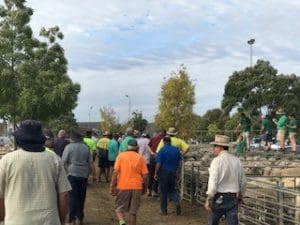
The smaller crowd at the Ouyen sale last week was indicative of coronavirus restrictions at many centres.
SALEYARD selling of livestock in Australia is set to continue despite a further tightening of coronavirus COVID-19 restrictions on business and the public nationwide.
In announcing a suite of further restrictions Prime Minister Scott Morrison said decisions on outdoor and indoor markets would be made by Australia’s state governments and territories.
Sheep Central has confirmed that livestock saleyard sales will be able to continue in Victoria, Ne3w South Wales and South Australia, although some centres have cancelled scheduled store cattle sales.
“Outdoor and indoor markets, excluding food markets like Flemington and things like that, because they are essential to ensuring the food supply right across the country, they will be addressed specifically by states and territories in each of their jurisdictions,” Mr Morrison said.
“States and territories have very different arrangements in terms of the types of markets that they have and they will be making those decisions specific to their states and territories.
“But the point and the principle is very clear; large gatherings brought together by particular organised events are things that we are seeking to avoid,” he said.
“And that is the principle the states and territories will be seeking to follow.”
A spokesman for New South Wales Minister for Agriculture Adam Marshall said primary industry production and related businesses, including livestock sales, and the entire food supply chain are not impacted by new COVID-19 restrictions.
“These businesses can continue to operate on a ‘business as usual’ basis, though should adhere to social distancing measures,” he said.
Sheep Central obtained similar advice from a spokesman for South Australia’s Minister for Primary Industries and Regional Development Tim Whetstone.
In a Twitter post today, Victoria’s Minister for Agriculture Jaclyn Symes said farming and food production are not included in the further restrictions agreed by the National Cabinet last night.
“The agricultural supply chain is essential to maintaining access to the quality, fresh groceries Victorians are depending on during these uncertain times,” she said.
Several saleyard operators have restricted attendance of saleyards to agents, buyers, transport and yard management staff, and promoted personal hygiene and personal distancing to limit the coronavirus risk. Some saleyards are also offering remote viewing services
Australian Livestock Saleyards Association president Stuart McLean said the sector was looking for more clarification on the continued operation of saleyard sales and the interstate transport of livestock.
“We need some clear direction, not just for the saleyard industry, but also for producers who use the saleyard industry.
“How are they going to transact their stock if they can’t sell them through a saleyard?”
He said saleyards and stock agents have been proactive in implementing the COVID-19 protocols required.
“We want the producers to be able to keep producing food and we want to be able to get it to the people who want it.
“We don’t want panic buying of product and we don’t want the industry shut down, especially in the regional areas.”
On Tuesday this week, Federal Minister for Agriculture David Littleproud told Sheep Central that businesses impacted by the recent shut down are those designed to limit social distancing because the community ignored medical advice to do so.
“The Federal Government believes agriculture is essential to our food security.
“It’s important that states now give certainty to agriculture that they can still operate across borders.”

I’m a great fan of saleyard selling, as a culture, a ritual and a’day out’. However, there is no way distancing can be kept just to promoting personal hygiene and personal distancing to limit the coronavirus risk. ‘…’promotion is a long, long way from ensuring. In present circumstances, clearly online sales are safer. PM Morrison, whose authoritarian approach has not been well done, is wrong in allowing livestock at saleyards because they are held in the ‘open air’. A problem also lies in a lot of lots to get through. Hopefully no zoonotic transfer occurs from humans to sheep in the copious human spittle and sweat which will be around. I think a better form under the circumstances might be a form of agent-organised private treaty.